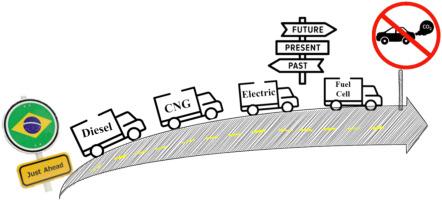巴西公路货物运输脱碳途径的技术经济和环境分析
IF 16.3
1区 工程技术
Q1 ENERGY & FUELS
引用次数: 0
摘要
本研究评估了巴西货运部门的替代卡车运输技术,以解决其显著的温室气体排放问题。作者通过一个综合的多维框架,分析了经济可行性、环境影响、基础设施要求和社会影响,评估了柴油、压缩天然气(CNG)和电动卡车的适用性。该方法结合了巴西特有的因素,包括能源矩阵组成、基础设施可用性和社会经济条件。分析显示,柴油卡车目前为巴西提供了最平衡的解决方案,具有较低的总拥有成本、成熟的基础设施和广泛的维护网络。尽管电动卡车具有优越的环保性能,但仍面临着高昂的购置成本和有限的充电基础设施等重大障碍。CNG卡车具有适度的环境效益,但在巴西各地受到基础设施的限制。该研究还确定固体氧化物燃料电池是一项有前途的技术,值得进一步研究,特别是在巴西多样化的可再生能源潜力的背景下。这些发现表明,有效的脱碳战略必须考虑到区域背景,而不是在没有适应的情况下采用全球解决方案。这项研究有助于发展现实的,适合环境的可持续货运途径在新兴经济体。本文章由计算机程序翻译,如有差异,请以英文原文为准。

Techno-economic and environmental analysis of decarbonization pathways for road freight transportation in Brazil
This study evaluates alternative trucking technologies for Brazil's freight transport sector to address its significant greenhouse gas emissions. The authors assess the suitability of Diesel Oil, Compressed Natural Gas (CNG), and Electric trucks through a comprehensive multi-dimensional framework analyzing economic viability, environmental impact, infrastructure requirements, and societal implications. The methodology incorporates Brazil-specific factors including energy matrix composition, infrastructure availability, and socioeconomic conditions. The analysis reveals that Diesel Oil trucks currently offer the most balanced solution for Brazil, with lower total cost of ownership, established infrastructure, and widespread maintenance networks. Electric trucks, despite superior environmental performance, face significant barriers including high acquisition costs and limited charging infrastructure. CNG trucks present moderate environmental benefits but encounter infrastructure limitations throughout Brazil. The research also identifies Solid Oxide Fuel Cells as a promising technology deserving further investigation, particularly in the context of Brazil's diverse renewable energy potential. These findings demonstrate that effective decarbonization strategies must account for regional contexts rather than adopting global solutions without adaptation. This research contributes to the development of realistic, context-appropriate pathways toward sustainable freight transportation in emerging economies.
求助全文
通过发布文献求助,成功后即可免费获取论文全文。
去求助
来源期刊

Renewable and Sustainable Energy Reviews
工程技术-能源与燃料
CiteScore
31.20
自引率
5.70%
发文量
1055
审稿时长
62 days
期刊介绍:
The mission of Renewable and Sustainable Energy Reviews is to disseminate the most compelling and pertinent critical insights in renewable and sustainable energy, fostering collaboration among the research community, private sector, and policy and decision makers. The journal aims to exchange challenges, solutions, innovative concepts, and technologies, contributing to sustainable development, the transition to a low-carbon future, and the attainment of emissions targets outlined by the United Nations Framework Convention on Climate Change.
Renewable and Sustainable Energy Reviews publishes a diverse range of content, including review papers, original research, case studies, and analyses of new technologies, all featuring a substantial review component such as critique, comparison, or analysis. Introducing a distinctive paper type, Expert Insights, the journal presents commissioned mini-reviews authored by field leaders, addressing topics of significant interest. Case studies undergo consideration only if they showcase the work's applicability to other regions or contribute valuable insights to the broader field of renewable and sustainable energy. Notably, a bibliographic or literature review lacking critical analysis is deemed unsuitable for publication.
 求助内容:
求助内容: 应助结果提醒方式:
应助结果提醒方式:


